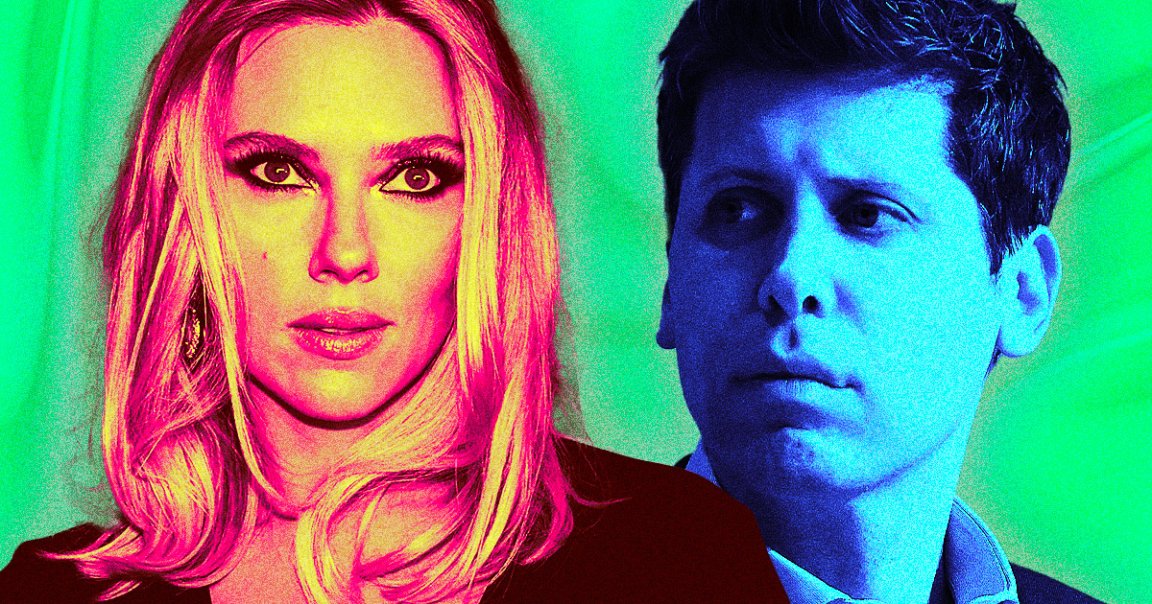
It sounds like Sam Altman, the CEO of OpenAI, did something interesting last year: he asked for consent.
That’s according to the actress Scarlett Johansson, who says Altman reached out to float the idea that OpenAI could use her voice for a new version of its ChatGPT chatbot.
“He told me that he felt that by my voicing the system, I could bridge the gap between tech companies and creatives and help consumers to feel comfortable with the seismic shift concerning humans and AI,” Johansson wrote of the interaction this week. “He said he felt my voice would be comforting to people.”
Johansson is inextricably linked to the contemporary conception of AI by her iconic performance in Spike Jonze’s acclaimed 2013 film “Her,” in which she voiced a chatbot that became romantically entangled with a human character played by Joaquin Phoenix.
“After much consideration and for personal reasons, I declined the offer,” Johansson recalled.
But “nine months later,” she continued, “I was shocked, angered and in disbelief that Mr. Altman would pursue a voice that sounded so eerily similar to mine that my closest friends and news outlets could not tell the difference” in a new version of ChatGPT that can carry out a spoken conversation with users.
“Mr. Altman even insinuated that the similarity was intentional, tweeting a single word ‘her’ — a reference to the film in which I voiced a chat system, Samantha, who forms an intimate relationship with a human,” she added. (Before Johansson went public, OpenAI pulled the voice down; after she aired her allegations, Altman released a statement claiming that the company had “cast the voice actor behind Sky’s voice before any outreach to Ms. Johansson” and that the AI’s voice was “never intended to resemble hers.”)
The situation is extraordinary because asking for consent, getting a firm “no,” and then going ahead and doing the thing anyway is an almost too-on-the-nose encapsulation of the hubris and contempt permeating the AI industry.
Its spokespeople — there are none so prominent as the increasingly ubiquitous Altman, who’s produced an endless stream of headlines with his simpering forecasts about how AI will soon make the world better for everybody — refuse to apologize for training their models on data indiscriminately scraped from authors, artists, and anything else they could scavenge online.
Sometimes the Altmans of the world tepidly offer that individual creators will be able to opt out of the racket, which is of pale comfort to writers getting replaced by ChatGPT or artists losing work to OpenAI’s DALL-E.
But trampling on Johansson’s wishes around her own likeness show how the industry really operating: by moving fast, seizing anything it needs to gain market share, and using rhetoric about potential utopias and doomsdays to try to wrangle permission after the fact.
In particular, it shows that Altman and his ilk scoff at the idea of consent. In a different world, they could have built systems like ChatGPT and DALL-E by starting with licensed training data, or training data in the public domain, or even just training data that allowed creators to opt in.
Grabbing what you want is more expedient, though, when there are billions — or as Altman claims, trillions — of dollars on the line.
Usually, the victims are small-time artists and writers who can no longer compete with an algorithm that can churn out an error-laden imitation of their style.
But in picking a fight with Johansson, Altman and his OpenAI cronies have turned an unflattering spotlight on their own shortcomings.
On an obvious level, trampling on Johansson’s wishes demonstrates a lack of ethics and trustworthiness.
More fundamentally, it also makes it increasingly hard to even see Altman’s crew as competent. The timeline he seems to have established — that he reached out for permission, didn’t get it, and went ahead anyway, complete with the coy little “her” tweet — is far more damning than simply building a chatbot that sounded a lot like Johansson.
OpenAI’s public image — and that of its CEO — has already crumbled substantially, so it can probably take another hit. What’ll likely be more interesting is if Johansson takes the matter to court, which she already hinted at in her public statement. After all, this is a woman who took on the notoriously litigious Disney over a breach of contract and got a settlement.
And to Johansson’s credit, the fight doesn’t sound entirely personal: she explicitly connected OpenAI’s disrespect to the broader harms brought on by its work and AI tech writ large.
“In a time when we are all grappling with deepfakes and the protection of our own likeness, our own work, our own identities, I believe these are questions that deserve absolute clarity,” she wrote. “I look forward to resolution in the form of transparency and the passage of appropriate legislation to help ensure that individual rights are protected.”
More on OpenAI: Sam Altman Clearly Freaked Out by Reaction to News of OpenAI Silencing Former Employees